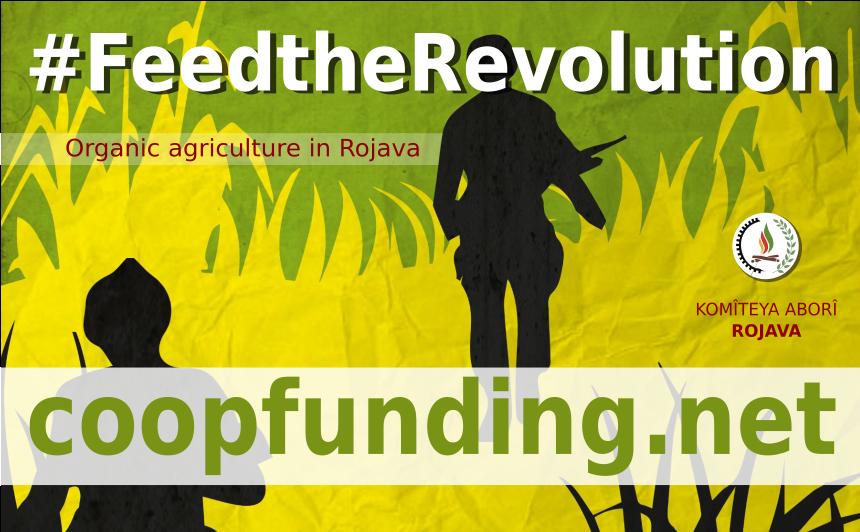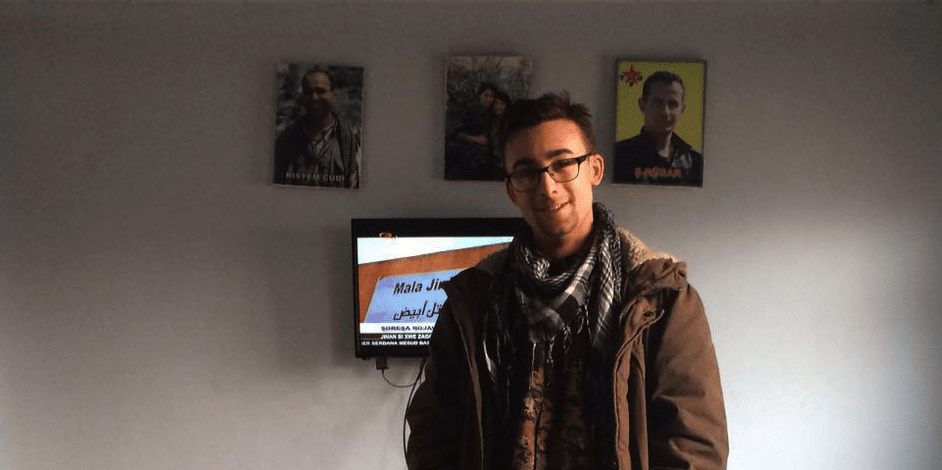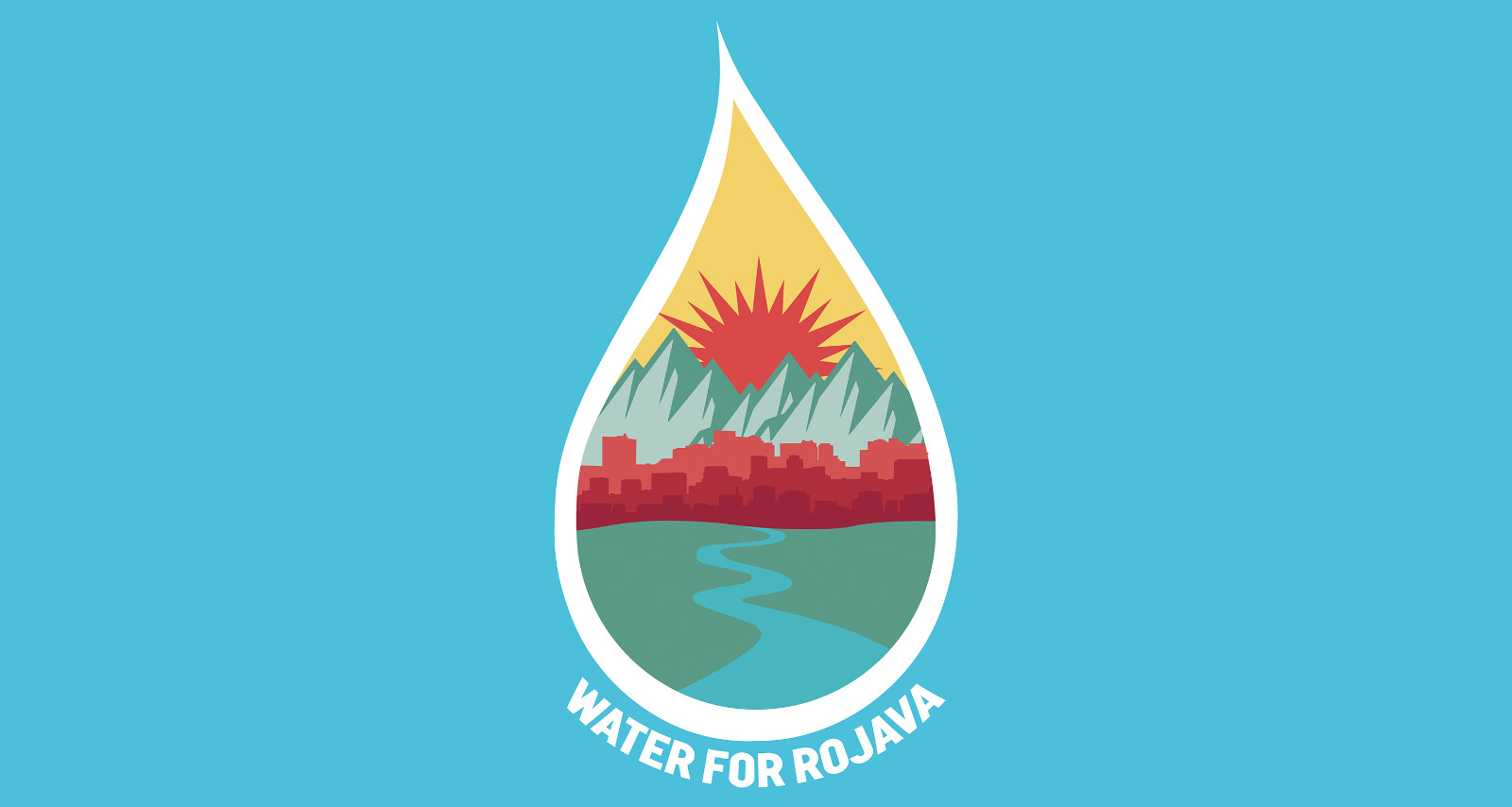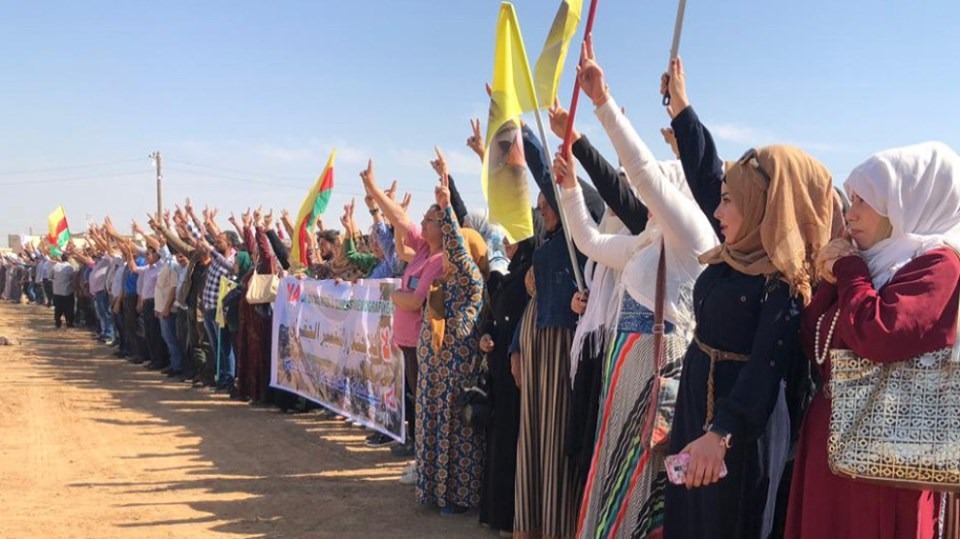Rojava Plan came to the attention of Plan C’s Rojava Solidarity Cluster earlier this year and as their Feed the Revolution fundraiser draws to a close we contacted them to discuss their reasons for being in Rojava, what plans they have been developing, and the logic behind their fertiliser project. We’ve also used this interview as an opportunity to find out a little more about the co-operative economy which is being developed in the region. Although information in English about the economic development of the Rojava cantons is quite limited but a useful primer by Abdurrahman Hemo, adviser for economic development in Cizîre Canton can be found here.
Plan C: Could you explain a little about the Rojava Plan: Who you are, past political experiences, what inspires you about Rojava and the logic behind the projects you are implementing.
Rojava Plan: Rojava Plan is the name we currently use for outside communication with the rest of the world it suggests our goals; we have a plan of projects to implement across Rojava. On the ground, here in Rojava, we are part of the Alternative Committee, which is part of the the Economics Committee. All committees here are autonomous groups that form part of the democratic process of confederalism; starting at neighbourhood level and coordinating through levels to cover larger areas; whether districts, cities, or cantons.
Our group is made up of both Kurdish people and international volunteers who are working together for these particular projects that are aligned with our own fields of expertise and experience, that complement the values of the social, political, and ecological revolution of Rojava, and are required imminently to solve the problems currently facing Rojava. As many will know, these problems are mostly due to the devastating effects of the embargo from both Turkey and the Kurdish Regional Government as well as the continuous problems the local population face due to the consequences of war.
For those of you who have travellled to Rojava, what is it about the project here that has inspired you?
Our individual political opinions and previous experiences are quite varied, but together we believe in the ideology of the revolution. After varying amounts of time spent in Rojava working individually in different fields of work, we now all have in depth experience of how the practice of the ideology is working at all levels. For example, there are women here who before the revolution could never step outside their own home alone and they were even discouraged to study or work, but now they are participating in the democratic process from the local level to the canton level, they are protecting their local neighbourhoods by being part of the local voluntary self-defense unit, the HCP, and they are organising in centres together as women to empower each other to break patriarchal power structures they have in their family homes or in general society. Men are taking lessons from the new research the women are doing on patriarchy and dominant societies; they are listening, understanding, and changing their deeply ingrained attitudes.
Women, young and old, single and married, are leading the way to free the whole of society from thousands of years of oppression from the structure of dominant societies. The participation level is not just impressive in a political sense, it is even more impressive in a social sense. This is what makes the revolution in Rojava unique; it is social as well as political. For the international volunteers, they can compare the participation rate of activism in the West, for example, and see that Rojava has a direct answer to overcome the problems of participation of the general public in politics and society, which is a direct solution to the fixing the problems of capitalism. The movement as a whole also want to share their ideology with the people of the world, to work together towards a common revolution. This is what inspires us all about Rojava.
To what extent are the ideals of the revolution in Rojava being taken up by ordinary people, not just members of the PYD? How is the revolution and its ideals being taken up in non-Kurdish regions?
What is important to realise, is that at the beginning of the Syrian revolution, an overwhelming majority of people in Rojava decided to stay, to take up arms against those who were opposed to them like the regime, Al Nusra, and the Free Syrian Army, contribute to the autonomy of Rojava and towards the social and political revolution. This makes it a popular revolution.
There are no official statistics yet, which causes a problem for people in Rojava trying to convince solidarity activists that the continuation and development of the revolution is as real as it is. Every commune has a Mala gel (House of the People), as well as a Mala jin (House of the Women). These serve as social centres and as places for education seminars, but primarily as places where neighbours gather to discuss social and political issues. They also form committees specialising in the topics like economics, health, education, self defense, which are mandatory in every commune, plus any others that the commune decides are needed. On social issues related to their commune, such as with problems within families, they discuss together with all the members of the family until they have found a solution to the problem. If no solution can be found for any committee or social topic, the issue is moved to the district level, and if a solution cannot be found there it moves to the city level, then canton level. Within the Malagel, they elect two representatives, one man and one woman, as well as a helper. Within the Malajin, it is exclusively for women’s participation and deals with all issues related to women. They also form committees, which focus on involving women’s perspectives into the areas of economics, health, education, etc.
This is how it is in every single neighbourhood in Rojava. So although every single person isn’t involved, and also some more or less than others, then the whole system is still based on the participation of ordinary people. The aim is to involve more and more people, so those who are already involved regularly go to the homes of others to speak with them about what they can be involved with, how it works, and why it is important and beneficial for them personally.
As for other ethnicities within Rojava, the situation is complicated. The movement tries to involve everyone, with quotas on the election of committee members. They also encourage displaced people from ISIS territory to join cooperatives and get involved with the movement. It is going well and there are many Arabs and other ethnicities involved at every level. But the historical past of Syria and the Middle East in general make it a bigger task than usual. For example, cultural traditions prevent many women from being involved in activities outside the home, so when other ethnicities feel fear or mistrust due to the historical divide, it is more difficult to get these women of other ethnicities to break out and join the movement. There is also a big task when a new town is liberated from ISIS territory. The negative propaganda used by ISIS against the YPG is very effective, so when the YPG enter the people are afraid for their lives. But gradually they see that the propaganda was not true. When Shadadi was liberated for example, over 600 Arabs joined the YPG.
So in conclusion, yes this is a popular revolution, it touches all corners of everybody’s lives. There is obviously still more work to do in terms of involving more and more people, but the movement is on the right track, and much further than one could possibly imagine given the short time span since the revolution began.
Could you tell us a little about any projects you have done before starting the fertiliser project?
The fertiliser project is the first project we will undertake as the Alternative Committee of Rojava. Around one year ago, we went to the Economics Committee with proposals of over one hundred projects and together we narrowed it down to 26 that were seen by the Economics Committee as the most vital to implement in the coming year. Together, we realised the importance of the fertilizer project, and the need for it to be our first project and begin as soon as possible. Once we have proven that the fertilizer project works, it will be implemented across Rojava, and we then also have the trust of the locals in our competence to implement the other 25 projects we want to do this year.
Why in particular is the fertiliser project important?
There is a long story behind the political history of Rojava, but in short, the full production of many products was prohibited by the regime so no manufacturing facilities existed here. For example, a monoculture of wheat was grown all across Rojava at the control of the regime and then had to be sent to other parts of Syria to be made into flour for bread. This meant that when the revolution began, Rojava had to rely heavily on imports of everything, including bread, even though the entire region was growing masses of wheat.
The embargo from all sides was implemented at the beginning of the war, however trade was still happening through Iraqi Kurdistan; the Kurdistan Regional Government (KRG) implemented very high fees, particularly on importations into Rojava. However, for almost three months now, the KRG has completely closed the border for trade and for people. This means that Rojava now has to immediately become completely self-sufficient. To understand this with the political history shows how big of a task this is.
Rojava has come a long way and developed production facilities. But as for crops, chemical fertiliser was one of the most important, and expensive, products needed in Rojava which relied exclusively on importation. Since the complete embargo began, it has not been available at all, so crop production will suffer dramatically this year, with only an estimated third of the required yield being harvested. Food production will suffer dramatically if a solution isn’t found and implemented. People will have no choice but to leave and probably make the terrible journey to Europe, which affects the unstable political situation there, as well as the relations between Turkey and the EU with their blundering deals.
Our solution is to create facilities to produce organic fertiliser locally, from the collection of natural waste from all households. This is what we are crowdfunding for, to Feed The Revolution.
So far, we have the facilities where the factory will chop the organic waste which will then be stored to ferment into fertiliser. The buildings need to be refurbished and the ground needs to be prepared to suit the requirements. We have also conducted interviews to find teachers that will educate the population in the local neighbourhood centres on the importance of separating their waste and the benefits of composting. We are looking to employ people who are enthusiastic towards the idea, and also to meet the values of the movement on representation of all ethnicities as well as a higher proportion of women. We, and the movement, believe this type of selection is necessary to break the barriers of social oppression usual in societies and which could potentially still happen here if not implemented properly.
At the time of publishing your fundraiser has raised €77’000, and is €100’000 short with 9 days to go. Although you’ve raised an amazing amount of money there is still a considerable way to go! Do you think you can reach your target? If not, presumably the project will go ahead in some form?
We need to reach our goal of 180,000 euros in order to obtain all the equipment and materials needed for the project and to pay salaries to the workers and teachers. We chose all materials in accordance with what is available in Rojava and at the cheapest price possible considering the quality required, so that the fertiliser project could be reproduced everywhere here. If we do not reach our goal, we still need to go ahead with this project, as there is no other option for fixing the food problem. This would require much more time looking for alternatives, maybe waiting for the possibility for a border opening for more options on materials, and also many downgrades on the quality of materials and tools that are needed to produce effective fertiliser.
Other than donating money, what can supporters of Rojava do from beyond its borders?
The best a supporter could do would be to come here directly to see for themselves how important and real this revolution really is. They could contribute with their expertise in some fields that are lacking here, due to the displacements that have happened as a consequence of the war. But until the border opens again, this is not an option. Instead, people should first get to know the ideology here, then they can make proposals on certain fields of their expertise or knowledge in economics, education, alternative healthcare, technology, or agriculture etc, since all of these fields are looking to be developed in an alternative way to the capitalist system. What is also directly needed is translation work, for documents and any media coming out of Rojava. A way to support Rojava financially is to get into contact with the Kurdish diaspora in Europe, who usually share their economy with their family who remain in Rojava. Many of these families have businesses in Europe, many selling Kurdish products which also add to the political awareness and solidarity with the Kurdish cause, so people can buy from them and the money would be shared with their families here, who would then use it inside of Rojava and thus enhance the economy.
We have read many positive reports about the development of the co-operative economy in Rojava. To what extent are co-operatives and decentralised projects being prioritised as a development plan? How secure will this developing economy be if/when the embargo is lifted?
Co-operatives are being prioritised above everything else as a way of advancing the economic, social, and political theories of democratic confederalism and this will continue to be the case. There is a huge network in place to encourage people to start cooperatives. Land or buildings that have not already been taken by those living in an area are given freely to anyone wanting to start a cooperative. Complete decentralisation is the aim of the movement, through co-operatives and in the political processes. Resources such as oil are also mostly under common ownership. The problem there is that the locals didn’t know how to take the oil effectively, so many of the drills and fields are now ruined. There is a big lack of oil experts in Rojava, but those who are here are moving around to teach others in oil engineering and then moving on to the next.
When/if the embargo is relieved there will be challenges to the decentralised system in the form of capitalist interests from outside Rojava. Capitalism is very strong in economic growth development, especially with resources such as oil, so the challenge for the movement will be in competing with this economically. However, the movement has a different perception on economics than capitalism does; they are aiming for democratic collectivisation of land and resources in a sustainable and ecological way, not never ending exponential growth. This is one of the main reasons that people from outside Rojava need to stand in solidarity with the revolution here. Recognise that Rojava’s revolution is the one we should all be supporting and aspiring to. Practice that support by organising yourself in the same way; locally and with patience and an underlying ideology. If capitalism and state-systems then attempt to contend with Rojava, it will have to admit its dictatorship to the whole world, and attempt to contend with all that others outside will have built.
Thanks to Rojava Plan for answering these questions.
Rojava Solidarity Cluster





